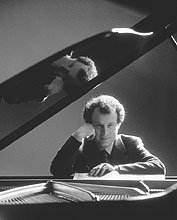S & H Concert Review
Beethoven, Schubert, Andras Schiff (piano & conductor), Philharmonia Orchestra, 11th April 2003, RFH (AR)
The programme notes open with a message from the conductor/pianist Andras Schiff and – in the context of this Klemperer-like programme – is worth quoting in full:"Otto Klemperer’s recordings with the Philharmonia Orchestra of masterpieces by Bach, Mozart, Beethoven, Haydn and others have been a revelation and inspiration to me since my teens. Today, I admire him even more. His humanity, razor-sharp intellect, sense of rhythm, and grasp of form and structure are always in the service of the composer and of the work. He thinks and feels like a composer. In an age of overblown conducting stars, his lack of ego and vanity is all the more remarkable. We must always remember him as a monumental musician."
Andras Schiff’s direct, ‘classical’ reading of Beethoven’s Coriolan Overture was indeed conducted in the manner of Klemperer: measured tempi, taut rhythms, a clarity of orchestral textures coupled with an architectural grasp of structure. However, what was lacking was Klemperer’s strong sense of establishing a dark, weighty bass-line (so essential in Beethoven’s scoring). This may have been due to the mere four double basses which were placed at the back of the platform divided by the timpani in the middle. Both the ‘cellos and basses were barely audible and often the woodwind were not pointed enough. The Coriolan is arguably the most difficult of Beethoven’s overtures to conduct (and even Toscanini confessed he had always had trouble with it) but Schiff rose to the challenges presented by this piece magnificently, especially the difficult closing passages, aided by Andrew Smith’s usual vigorously intense timpani playing.
The rarely played Schubert 4th (‘Tragic’) Symphony in C minor is misconceived as a ‘light’, delicate piece of chamber-like intimacy: nothing could be further from the truth. Written when Schubert was 19, this is nevertheless a ‘mature’ work and points towards Schubert’s Great C major Symphony in its melancholic darkness and stark grandeur.
In the slow introduction – Adagio molto - Schiff caught this sense of Sturm und Drang, with fully realised pathos, before leading seamlessly into a vivacious Allegro vivace. This Schiff conducted with great urgency and great momentum. What was at fault was the rather recessed and unfocused woodwind playing, as well as the barely audible trumpets. Sitting centre stalls very close to the stage I noticed that Schiff never glanced over to the trumpets throughout and maybe this is why they never seemed to be an intrinsic part of his performance. While the Andante was well paced it often sounded rhythmically slack and again the woodwind lacked focus. The third movement – Menuetto: Allegro vivace - lacked urgency, energy and attack; the opening should sound menacing and manic rather than slack and limp. The very important woodwind parts yet again lacked clarity and incisiveness and in the lyrical passages, Schiff indulged in unnecessary slow tempi which just sounded mannered.
The Allegro was conducted with greater precision and weight, with some mordant timpani playing from Andrew Smith who shone throughout this rather string-oriented performance. While Schiff generally conducted this symphony sensitively and sympathetically he tended to tone down the horns, trumpets and woodwind making it sound like a symphony for strings (and timpani). Listening to Klemperer’s tough and grainy performance of Schubert 4th Symphony with the Concertgebouw Orchestra (2nd February 1957) makes one realise straight away how very light-weight and effete the orchestra textures were under Schiff.
The rather short second half was devoted to a spellbinding performance of Beethoven’s Third Piano Concerto in C minor with Schiff conducting from the keyboard. Here the Philharmonia suddenly took on a new lease of life: they just seemed somewhat more involved: the dialogue between pianist and orchestra was perfectly realised throughout. In the opening passages of the Allegro con brio, Schiff stood up to conduct, again without a baton, and drew playing from the woodwind of a quality so lacking in the Schubert.
Schiff’s own playing is in a class of its own, and defies easy analysis. His playing had a shimmering quality, totally lacking in affectation, being more concerned with the actual notes rather than special effects. It was wonderful just watching his delicate hand gestures whether conducting or playing the piano. What was striking about this movement was the incisive interaction between pianist, woodwind and timpani which created great tension. The Philharmonia were deeply sensitive to Schiff’s shifting moods, and yet again it was Andrew Smith’s assured timpani playing that gave this movement even greater power.
The Largo was profoundly played by Schiff and the orchestra in a melancholic haze before the Rondo Allegro shifted gear, with pianist and orchestra taking on a genial energy and unbuttoned humour; Schiff’s playing here had a particularly playful lilt to it; he also realised the taunting dialogue between the military-style punctuations of brass and timpani with the piano to perfection. This majestic performance ended with a power and an intensity which brought the house down. Indeed, I am sure this superb performance would have got a gruff nod of approval from Klemperer himself.
For an encore, Schiff played an excerpt from a Schubert piano sonata played in a dark and fragmented manner worlds apart from Beethoven, demonstrating this pianist’s versatility. Andras Schiff showed an appreciative audience that as well as being a magnificent pianist, he is a gifted conductor.
Alex Russell

 Return to:
Return to: